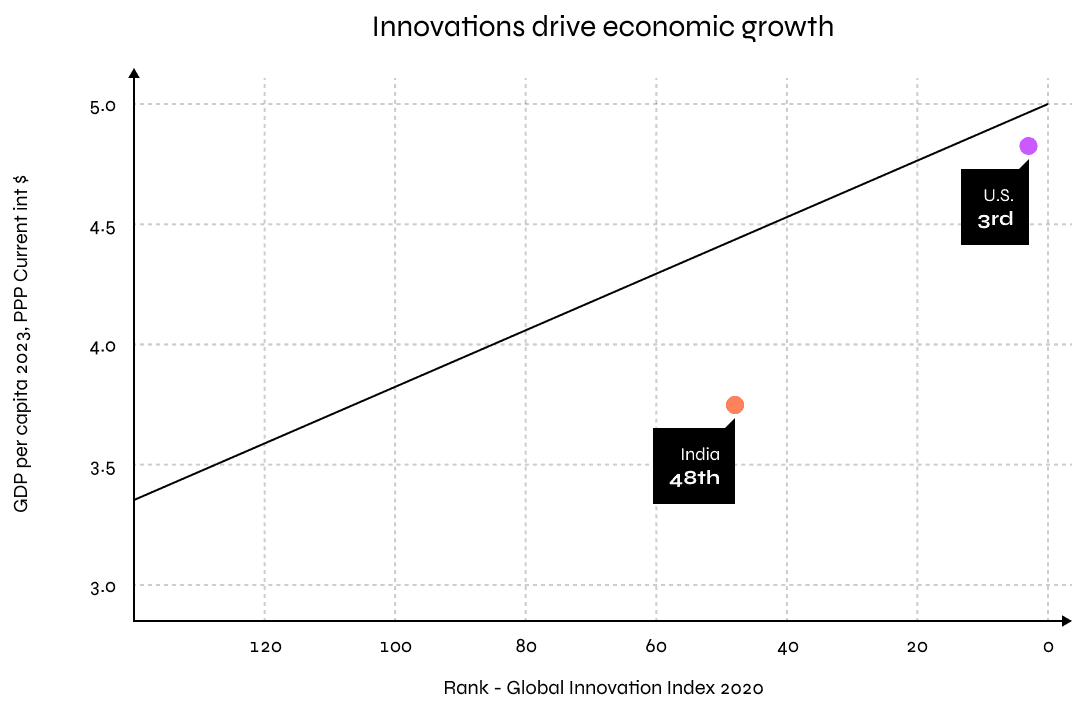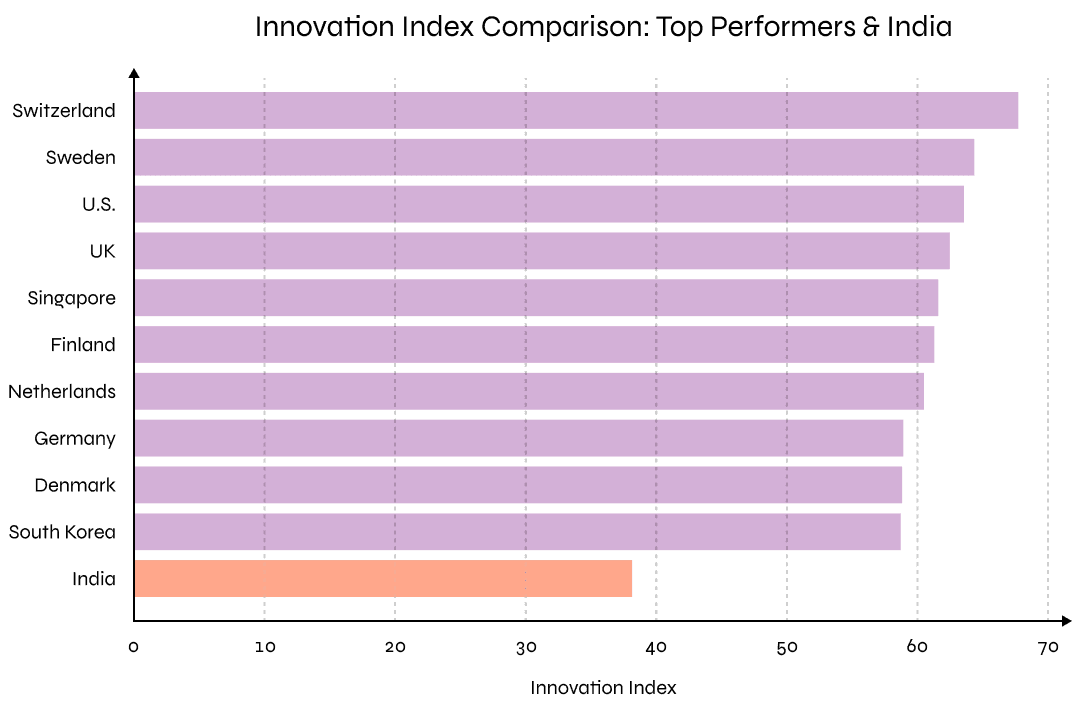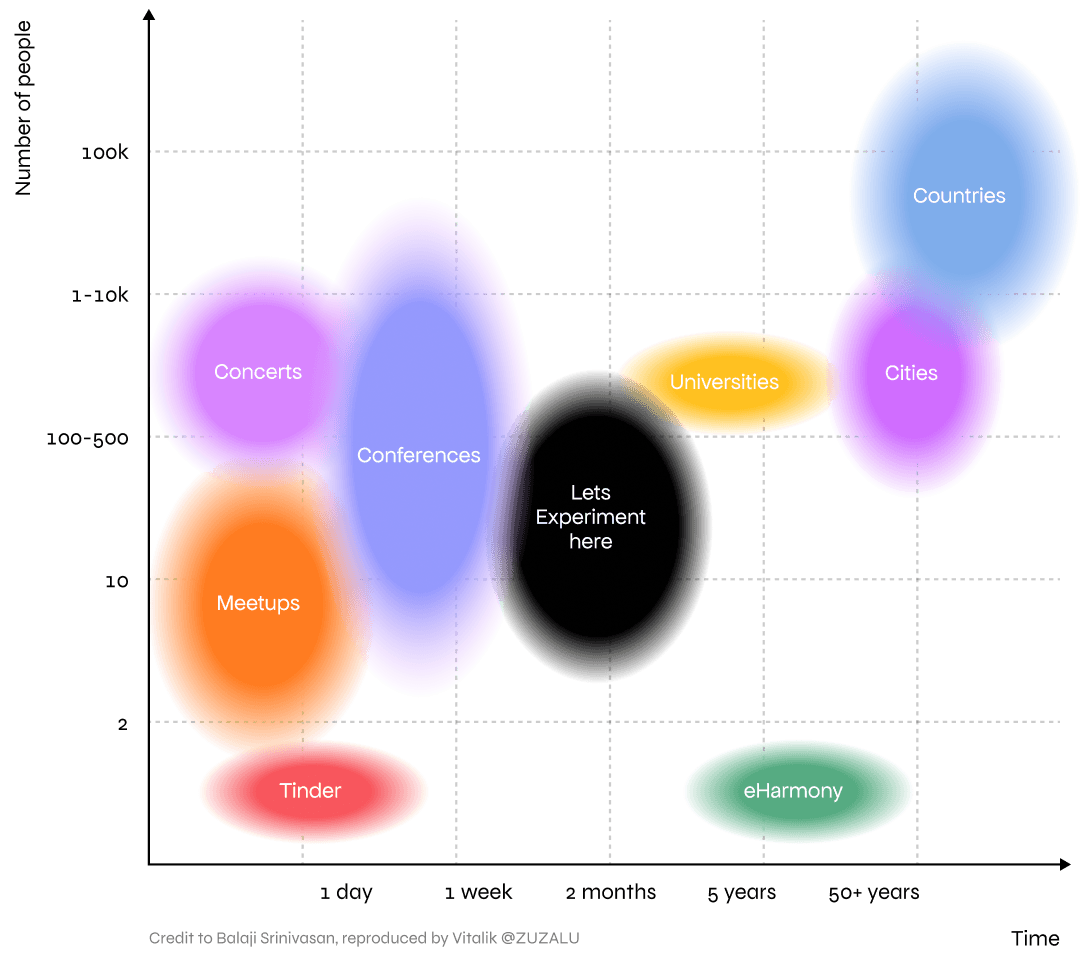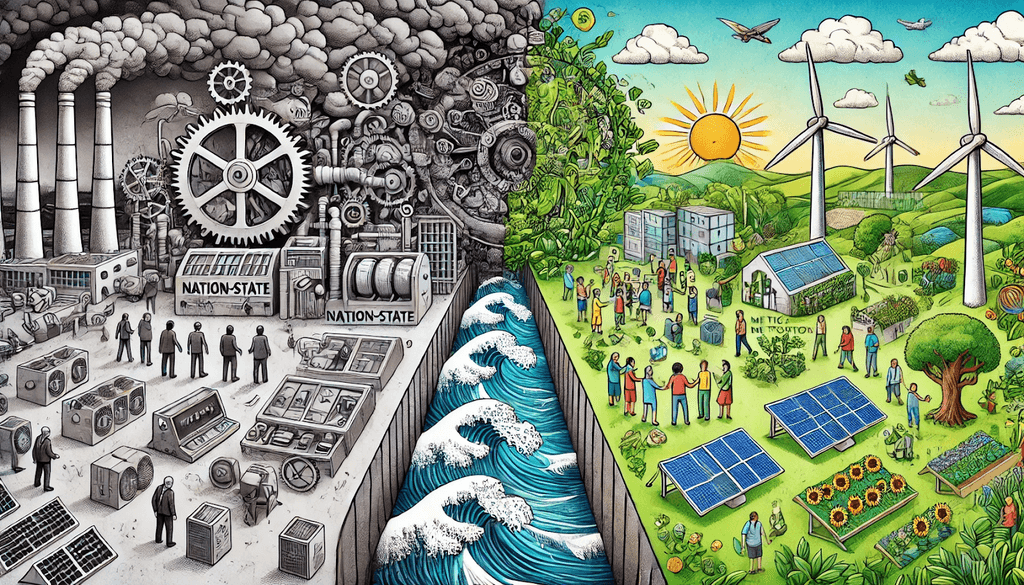India has an immense opportunity to move the needle of technology in a way that it helps humanity. Technological progress is a key factor for human progress (but we must do so with calculated caution) and innovation in technology is a (lag)-indicator of a country’s GDP. India’s young population can help create a future that promises hope, resilience, and wonder.
Whether GDP is a useful metric to measure progress is definitely up for debate, but we can use it as a proxy.
India’s scalability, speed, cost-effectiveness and demographics puts it in a unique position. However, India has its share of challenges like – corruption, air pollution, social cohesion, sanitation, governance inefficiencies, etc. These challenges are not insurmountable. As humans, we would want to be more coordinated, to thrive and to flourish. It is imperative that we focus on improving existing systems and creating robust frameworks.
Many of these problems have a few common denominators – ambition, talent and capital. These three factors have very complex interactions with each other and with society as a whole. Addressing them thoroughly is not an easy task due to their inherent complexities - it is not an easy task to do. For example, for each factor we could ask questions which are related to efficiency and efficacy.
How can we find the right talent for the right set of challenges?
How can we allocate capital efficiently to these challenges and to these talents?
How can we build this talent pool?
What sort of values do these talent pools have?
What sort of talent is required in the 21st century?
How can we enable the talent pool to do ambitious things?
What sort of values do these ambitious ideas have?
How can we build ambition and does ambition lead to efficient solutions to problems and challenges?
While being aware of its interaction, we are going to try to keep these elements separate as we think these three factors are the main bottlenecks to solving most of India’s challenges. Through Zu-Grama, we do not want to only address this but also figure out how India’s talent, ambition and capital contribute to the much broader network of communities and societies and global challenges. We will talk more about how Zu-Grama can enable some potential solutions to address these issues. But before that, Let us dig more into India-specific context.
India-Specific Context
India seems to be at a crucial juncture politically and technologically.
Let’s take a look at the governance first - there is a rapid rise in religion and communal tensions driven by the governance of India (so much so that the national educational research body decided to remove Darwin’s theories from schools’ scientific syallbus), India’s corruption is a point of concern (India is ranked 93rd out of 180 countries in the corruption perception Index).
Technologically, the Indian government only spends ~0.7% of their GDP in research, India ranks 40th in the global innovation index and is doing very well compared to other lower - middle class income countries. India’s free and open source (FOSS) community is fastest growing among others in the world. India’s digital payment infrastructure - UPI is much better than what is in the West. There is however more nuance to this, India produces highest number of engineers per year but they are usually not suitably trained. India’s research output is high but the impact of research and citations seems to be very low. While India has been the major exporter of IT services, a leader in cost effective drugs, there is not much effort in drug development or breakthroughs in information technologies like blockchains or machine learning.
India has the potential to be a bit more cypherpunk, here’s a look at how India is doing compared to a few other countries.
Despite these interesting numbers, why do we not have that many breakthroughs from India?
India is a growing country and many realities get morphed by the up-and-to-the-right graphs of anything India. We should also consider India and Indians’ risk taking appetite - which has been historically less due to socio-cultural factors (culture and traditions are forces which prevent risk taking and hence innovation). With ~60% of its population under 30, this demographic shift will likely propel a greater risk tolerance culturally and economically in the years to come.
Important technological and intellectual discussions are predominantly centered in the West. Pivotal conversations and actions around movements and innovations - like in AI, blockchain, biotech, effective altruism, rationality, longevity etc. do not permeate India as much. Can we bring more of these discussions to India in high-quality?
This geographical centralization can be seen by the level of innovation and originality in Indian startups and the limited existence of an ecosystem. Even with globalization today, such conversations in India are very few. In places like Europe, US (especially in SV), there are regular conferences, community ecosystem, support and funding structures and in abundance compared to the systems in India.
It begs some of the following questions:
(but please note that I do not claim that these things would be better if they originated from India nor am I saying that India should build these in the future)
Why do Indian startups not innovate? (truly innovative startups in India are very few and many unicorns in India often replicate the business models from the West)
Why do Indians not try to solve problems such as global catastrophic risks or existential risks?
Why didn’t companies like Apple, OpenAI come from India?
Why didn’t technologies like Ethereum and Bitcoin originate from India?
Why is the risk taking culture of Indians so less?
More on Why?
Why do I say ambition, talent, and capital are the main challenges for India? Let's break it down.
Corruption in India stems from how political leaders shape the culture of public offices. The one-person-one-vote democracy, while being the largest in the world, has flaws. The electorate's role often seems misplaced; vote-buying is an open secret and an ineffective incentive mechanism. People are often swayed by flashy rallies or celebrities running for office. Those who enter politics often end up in a situation wanting to preserve their power, diverting efforts into maintaining their status—a manifestation of the Moloch we must avoid. How many people truly understand the nuances of different parties and political positions?
Despite the electorate's power to demand better governance and less corruption, these issues persist. We need smarter incentive mechanisms to tackle corruption, coordinate effectively, and defeat Moloch.
ChatGPTs interpretation of “The implicit question is – if everyone hates the current system, who perpetuates it? And Ginsberg answers: “Moloch”. It’s powerful not because it’s correct – nobody literally thinks an ancient Carthaginian demon causes everything – but because thinking of the system as an agent throws into relief the degree to which the system isn’t an agent” taken from meditations on Moloch
Indian talent is surviving the most intense competitive landscape, they are inside a system which has incentivized through multiple mechanisms to be more risk averse, to get an education without understanding consequences, to participate in the national religious tensions etc. which makes it hard to change the system.
India's economy is projected to grow rapidly due to its large and young population. However, this growth direction will depend heavily on India's ability to innovate, get funding for the efforts, think critically, pursue the truth and avoid getting into undesirable equilibria. This is crucial when considering the future paths of the country’s youth over the next 20-25 years.
Can we do all the things mentioned below but at the same time avoid Moloch?
Can India Innovate? How can Indians help solve the most pressing problems of India and the world?
Can we help Indians take more risks?
How can we help Indians become more truth-seeking, to counteract biases and misinformation spread by the media, and make more informed choices?
Can we develop an ecosystem that supports innovation and risk-taking?
Can we take bets on the Indian talent pool much earlier?
How can we address these challenges?
One way to tackle governance issues is to directly engage in the political system by forming a political party with zero-corruption values. However, this approach often fails because once involved in politics, individuals and parties must operate within the system's constraints and they often end up playing the game of staying in power. Similarly, starting another school or university within the current profit-driven model will likely lead to the dark side of education. And becoming another VC fund in India often means adopting a risk-averse approach that stifles innovation. Many people and organizations are already trying these direct methods. These games will mostly lead to undesirable equilibrium and we need to think of coordination mechanisms, systems and technologies that can circumvent these problems with clever incentives that lead to a more desirable outcome. See Scott Alexander’s amazing piece on Moloch for more.
This might involve experimenting with alternative governance models, innovative educational frameworks, and novel funding structures.
Can we build a vehicle that can channelize the Indian energy and provide pathways that does not follow pre-determined paths that lead to Moloch?
Inspired by the original Zuzalu in Montenegro, Zu-Grama will be a pop-up village lasting one or two months. This initiative will bring together people from diverse communities (AI, longevity, biotechnology, spacetech, effective altruism, rationality, global catastrophic risks) to co-live and co-build solutions to these challenges. Zu-Grama will contribute to the broader Zuzalu ecosystem, working collaboratively to tackle governance, education, and capital challenges with innovative approaches.
Zu-Grama will experiment with structures that could lead to more desirable outcomes. Given the complexity of these challenges, it's essential to be truth-seeking and have quick feedback loops to avoid creating new ways that might end in undesirable equillibria. Through Zu-Grama, we aim to address these fundamental issues:
Talent: Education (not just schooling) leads to talent availability in a community. Imagine a system which is at 10% intensity of a university designed for life long learning (Vitalik has spoken about it a few times). Imagine a place where we can learn about cutting edge technologies, philosophical movements and ideas, a safe space that faciliates rich conversations, discussions and debate, a place that provides agency, inspiration and motivation to solve these problems. The system would have an emphasis on truth seeking and reasoning tools - crucial elements that are required for Indians to navigate the current waters politically and technologically.
Ambition: Sometimes ambition can be misplaced which can lead to futile effort. Many people currently are incentivized to try and approach these problems within the boundaries of today’s systems – some people choose to exit the system (the brain-drain of India) and some people try to fix these challenges but in a very competitive environment (the race to become a public servant). But what if we designed a residency to foster discourse on critical issues, ignite ambition, and facilitate learning from experts, builders, and thinkers? A place where every interaction within a community and in your life could spark a fascinating conversation leading new learning experiences and cross pollination of ideas?
There are challenges, of course. How do we select the right people? What is the optimal number of participants? How do we balance between those already doing ambitious things and those looking to start? These are crucial questions for designing a successful residency.
Capital: Imagine a place where talent can create MVPs in hackathons, validate their ideas within a value-aligned community, and find capital to scale their projects. What if there was a fund aligned with the values of the Zuazalu ecosystem, designed to take early bets on people and fund impactful projects and public goods in a way that we do not fall into the Moloch trap of the capitalistic world? This fund would support long-term human flourishing and could also fund public goods in other ZuVillages and address global problems.
The challenge lies in interacting with these funds and setting them up in a way that avoids falling back into undesirable equilibria. It's about creating a sustainable system that continuously supports innovation and public good – read more about our thoughts on how I think a pop-up village like ZuIndia can interact with its investors.
How will we actually achieve this and what does Zu-Grama look like?
One-way to think about Zu-Grama is – as an experimental layered-mechanism design that aims to not get into undesirable equilibria.
Inputs as talent (experts, builders, thinkers, doers etc.), capital (financial, time etc.), Ideas (the memetic energy of communities and problem sets) .
Processes containing technology, learning tracks, residency and community building (Intentional
design that enables cross-pollination of ideas and personal relationships), funding mechanisms (QF & retroactive funding, value aligned pre-seed investment & scalable projects), governance experiments with ZuIndia
Outputs being ambition & innvotion, successful projects, cross pollination & cultural exchange, problem set that other Zu-projects can help solve.
Expected outcomes (we do not want to build the outcomes into this design but let it emerge from the Zu-Grama experiment but here are some which I think might be possible)
Scaled governance experiment with local or national governments.
Initial collaboration with local political party Prajaakeya (note: there is no official partnership with this party , nor have I reached out but from the outset they seem to be value aligned and a completely different effort, just shown here as an example)
Eco-system for value-aligned startups or projects.
Inspire the nation state to do better by coordinating with ZuIndia.
Sustainable long-term village.
Solving India’s problems through broader Zuzalu values.
Zu-Grama will aim to keep the mechanism credibly-netural. We will ensure, through our intentional design of the residency program, that we will make it affordable for various social and financial backgrounds. We will ensure through our initial governance that the participants can alter the mechanism or give feedback or critique it. We will aim keep all things transparent and publicly verifiable – We are starting with this lite paper to also have our reasoning transparent.
This does make assumptions of existing problems (the three pillars we mentioned earlier) – but the experiment should be designed in a way that we can course correct (or extreme cases even stop) with feedback and consensus from those participating in the experiment and also from the broader Zuzalu ecosystem.
If we want to solve these problems, we need to start with small-scale experiments within the residency. We can explore different governance systems that are more democratic but avoid the pitfalls of current democracies, such as election hacks and the one-person-one-vote system.
How do we get the design right? By experimenting with various factors and leveraging current thinking - Zuzalu inspired multiple iterations with each running their own experiments and there could be a lot of data points to learn from.
By using the residency as a testing ground, we can innovate and iterate on governance models.
What sort of (opt-in) governance experiments we’d want to do within Zu-Grama?
Start off with a centralized team but with clear plans to make it more decentralized as we go - important to design it in that way from the beginning to not meet moloch ourselves.
Harberger taxes on desirable accommodation options – For rooms which are highly desirable during the residency (like one with the views or its own garden etc) could be taxed based on the self-assesed value of the room but anyone else can decide to buy out the room for teh self-assesed value.
Pluralistic consensus technology apps which we can be built and experminted within the community before scaling it to local governments.
Will Zu-Grama be a network state? That depends on how we define a network state. Building a completely separate state from the nation-state where Zu-Grama will be located isn't feasible or helpful. We are operating with the broader system of the nation state (nations own governance mechanism - its set of rules and incentives). Zu-Grama should be able to help and inspire nation states overcome its Moloch path . Zu-Grama can serve as an experiment to address India-specific challenges through degen-communism while also contributing to global issues. By coordinating with other pop-up village experiments in the Zuzalu ecosystem, Zu-Grama can make a broader impact.
Can we steer away from the abyss of Moloch?
There are many similar initiatives happening worldwide. ZuVillage in Georgia emphasizes cognitive sovereignty in their mission statement. Zuitzerland is prototyping a Swiss inspired network society. These diverse approaches show the potential of such experiments to drive meaningful change.
How will Zu-Grama interact with investors? It is important to capture the innovation coming from the experiment and enable the growth of the idea.
Imagine a fund that places importance on Zuzalu and Zu-Grama principles and invests in the projects that come out of the ecosystem. A fund that can by design (legally binding) not prioritize only profit over values and ensure. Some examples of how such a fund could look like:
Part of its profits go to public goods funding and scientific research or impactful projects.
If participating founders are successful, they contribute part of their exit to high-impact projects.
Participating projects pay a Harberger tax on their IP.
Participants provide input on what gets funded through decentralized funding mechanisms (at the same time not falling prey to group-think)
Place: Kerala, India
Time: Jan 5th - Feb 16th, 2025
Core Team: The Initiators
Yeshodhara Baskaran: https://www.linkedin.com/in/yeshodhara-baskaran-610096114/
Anish Mohammed: https://www.linkedin.com/in/anishmohammed/
Kritarth Chhabra (KC): https://www.linkedin.com/in/kritarthchhabra/
Contributors:
Chetan Kharbanda
Suramya Asthana
Akash
Pareen
Soham Zemse
Join our Updates Channel: https://t.me/+WEGHdd6xLHBlYTA1





